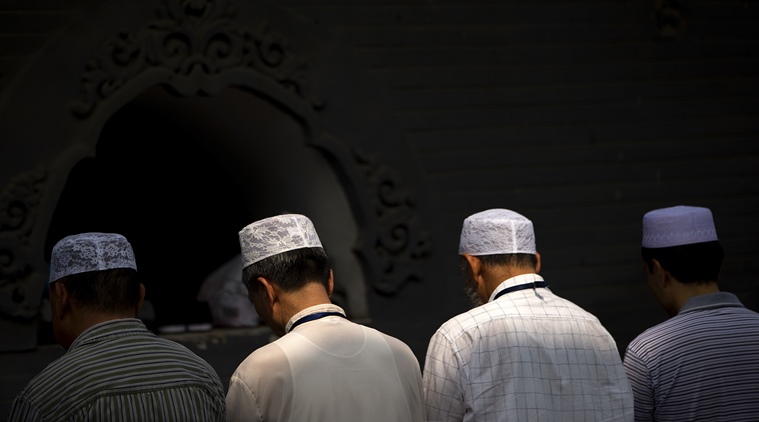Large protests by Hui Muslims halt demolition of mosque in China: Report
Most of the Hui Muslims speak Mandarin and apart from the white caps and headscarves are worn by the more traditional members of the ethnic group, they are indistinguishable from the majority Han population.

Chinese Hui Muslims pray during Eid al-Fitr prayers at Niujie Mosque in Beijing. (Source: AP)
Chinese officials have delayed the plan to demolish a newly-built mosque in the country’s North West after hundreds of ethnic Hui Muslims held sit-in protests in what is said to be the largest standoff in Beijing’s efforts to clamp down on Islamisation, a media report said Friday. A huge crowd of ethnic Hui Muslims, the second largest Muslim group after Uygurs of Xinjiang, gathered from noon until late last night in the square outside the Weizhou Grand Mosque thwarting plans by the local government to demolish the mosque.
The mosque is an imposing white structure topped with nine onion-shaped domes, crescent moons and four towering minarets. The local county head came to the mosque around midnight, urging everyone to go home and promised that the government would not touch the newly-built structure until a reconstruction plan has been agreed upon by the townsmen, the Hong Kong-based South China Morning Post reported quoting local sources as saying.
1m 18s

Artist exhibits China's water pollution problem
Chinese artist Brother Nut can point to some success from his Beijing exhibit that used 10,000 bottles of yellowish water to raise awareness of contaminated rural ground water, although it did not go down so well with Beijing authorities.
The stand-off in the town of Weizhou in Tongxin county in the Ningxia Hui Autonomous Region is the latest and possibly the largest conflict in a recent campaign to rid the region of what Beijing regards as a worrying trend of Islamisation and Arabisation, as the ruling Communist Party doubles down to “Sinicise religion”, the report said.
“Sinicise religion” is a policy introduced by President Xi Jinping in 2015 to bring religious groups in line with the Chinese culture and under the absolute authority of the Communist Party of China (CPC).
An official notice which was said to have been issued by the Weizhou government on August 3 had given the mosque’s management committee a deadline to demolish the building by August 10 on the grounds that it had not been granted the necessary planning and construction permits.
If the management committee failed to comply, the government would “forcefully demolish it according to the law”, the notice warned. But the Ningxia government said that after days of negotiations between the authorities and the religious leaders, it had been agreed earlier yesterday that the government would not demolish the mosque, but remove eight of its domes.
Many Muslims did not want to see the domes removed, the report said. “Now we’re just in a stand-off,” a local resident was quoted as saying in the report.
“The public won’t let the government touch the mosque, but the government is not backing down,” the unnamed resident said.
Construction of the mosque was completed last year. It replaced an earlier structure that had been built to replace Weizhou’s 600-year-old Chinese-style mosque, which was destroyed during the Cultural Revolution along with thousands of other temples, churches and monasteries across the country.
The government’s order sparked an outcry in the Hui Muslim community, with many people questioning why the authorities did not stop the construction of the mosque – which took two years to complete – if it had not been granted the necessary paperwork.
An official white paper released in April this year stated that China has about 20 million Muslims. Both Uygurs and Hui Muslims have a population of about 10 million each.
China is currently carrying out a massive crackdown against the East Turkistan Islamic Movement (ETIM) in the volatile Xinjiang province where majority Uyghurs have expressed concerns over the increasing settlements of the majority Han community. Since he took power in 2013, Xi has been emphasizing on the Communist party’s reinforcing its ideological roots of Marxism, including adherence to atheism.
As the government deepens its crackdown on Uygurs – another mostly Muslim group in the western frontier of Xinjiang – the Huis are also being targeted, the report said. Several mosques in Nigxia have been ordered to cancel public Arabic classes, while a number of private Arabic schools have been told to shut down, it said.
Unlike Uygurs who are of Turkik origin with ethnic ties to Turkey, Hui Muslims have been largely left in peace to practice their faith. Most of them speak Mandarin and apart from the white caps and headscarves are worn by the more traditional members of the ethnic group, they are indistinguishable from the majority Han population.






































No hay comentarios:
Publicar un comentario